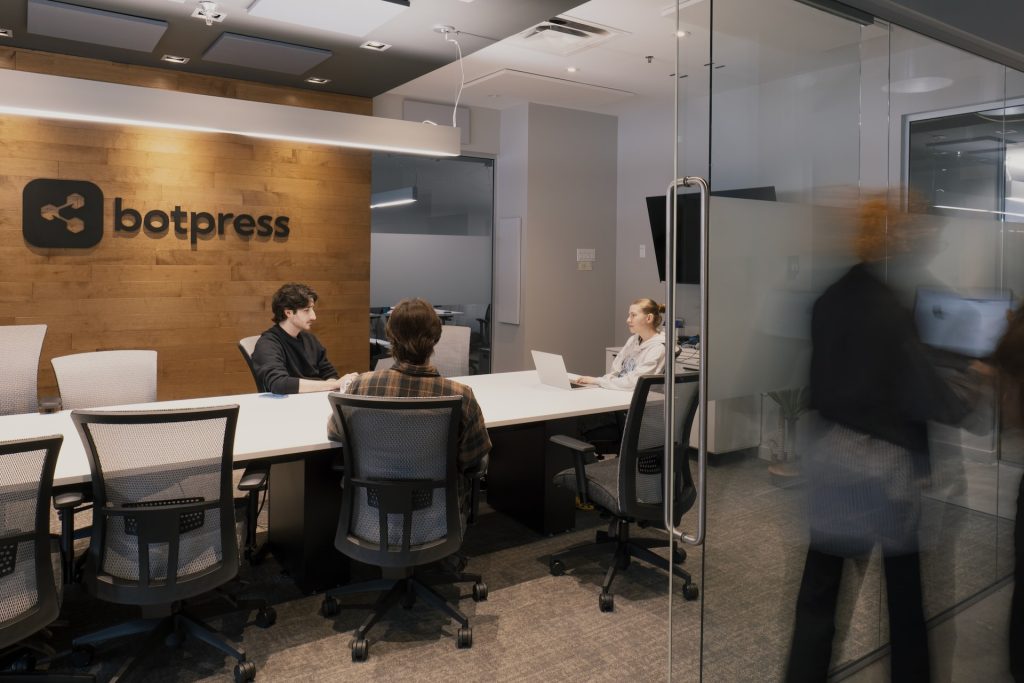Botpress has raised US$25 million in fresh financing as the Quebec City-based startup tries to build on its early success in the buzzy market for AI agents.
Toronto-based Framework Venture Partners led the all-equity Series B round, with participation from Canadian investors Inovia Capital and Deloitte Ventures and U.S. funds HubSpot Ventures and Decibel.
Talking Points
Major Canadian financiers, Framework, Inovia Capital and Deloitte Ventures, participated in the Series B round
The company sells software that lets developers build, test and manage AI agents. Businesses use the assistants to automate tasks like detecting bugs in code, responding to common customer service requests and generating and sending marketing messages.
Botpress will use the cash to double its 65-person workforce over the next year, said CEO Sylvain Perron. It will also hire a team to build agents for internal use to help the company learn how customers use its technology.
The firm wants to be “the Switzerland” of AI agents by remaining neutral among other tech firms, said Perron. Its platform plugs into enterprise tools like Notion, Salesforce, Shopify and Zendesk, so agents can easily access clients’ data and take action on their behalf. Customers can choose between large language models (LLMs) from providers like Anthropic, Cohere, OpenAI and Hugging Face to power their agents.
Most of those companies are also in the AI agent business. Enterprise software providers like Salesforce and ServiceNow are betting customers will want assistants built into the systems they’re already using to manage client relationships or IT. Other tech firms sell agents for specific departments within a company, like HR, sales or customer service. Model makers like Anthropic and Cohere have recently launched their own agent-building tools.
Perron believes Botpress has advantages over its competitors because it’s been using LLMs longer than the enterprise software providers and focusing on agents longer than the LLM developers. He said the startup also charges less to set up new assistants than most rivals.
Businesses don’t want to buy 20 different software licenses and weld them all together, Perron said—they’d rather have one central platform to run all their different types of agents. Clients also don’t want to commit to one AI model-maker forever. “Why would you pay much more to do that in this vendor-locked-in system?” Perron said.
Botpress’s main customers are development agencies that build websites and agents for businesses. That means Botpress doesn’t need an in-house consultancy to work with clients, Perron said, and it isn’t padding its recurring revenue figures with professional services fees—a widespread practice in AI, he claimed. “Most AI companies are actually servicing companies,” Perron added.
Founded in 2017, Botpress originally programmed chatbots the old way, by compiling huge lists of possible questions and then telling the tool how to answer each one. That changed during the COVID-19 pandemic. In 2021, while working on a tool for the Quebec government to answer health and safety questions from the public, Botpress realized that ever-changing pandemic rules required a new approach. “We had to find a completely new way of doing chatbots,” Perron said.
Botpress began working with a then-little-known company in Silicon Valley called OpenAI. “It wasn’t quite the GPT we know today,” said Perron, but he added, it was good enough “to rebuild the entire company around LLMs.”
In March 2023, Botpress launched its updated agent platform powered by ChatGPT. Since then, it’s taken off. Perron claimed Botpress now has thousands of clients, with sales doubling every quarter in 2024. “A lot of companies claim to have cracked agents,” he said, but many have only produced “shiny demos” and don’t have many customers using their technology.
Despite all the competition in the AI agent space, “there’s still room to build a massive business,” said Inovia Capital partner Magaly Charbonneau. The sales and marketing strategy is particularly important for AI companies, she added, because “any technology can be copied.”
Charbonneau has been impressed by how Botpress converts developers using its free plan into subscribers, then scales up their usage. Once clients reach the enterprise level, revenue continues to increase as they add tools for other departments. “That’s really hard to do,” Charbonneau said.
Botpress’s last raise was a US$15-million Series A in July 2021. Its new round comes at a time when raising money is far harder than in that easy-money era or the AI investing boom of 2023. Investors are closely watching how much cash startups are burning and what kind of return they’re getting on marketing spend, Charbonneau said. “We’re looking at those margins.”



